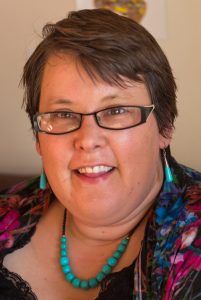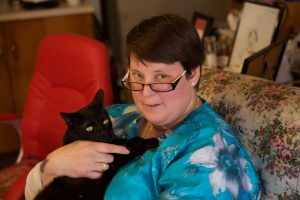Jeanette Purkis is an Autistic author, public speaker, and self-advocate. Jeanette has worked in the Australian Public Service since 2007 and has a Masters degree in Fine Arts. She is the author of three books on Autism. Jeanette has given many presentations including at TEDxCanberra 2013 and presenting alongside Professor Temple Grandin and artist Tim Sharp in Melbourne in 2015. Jeanette facilitates an Autism women’s group and is the 2016 ACT Volunteer of the Year. This week Jeanette discussed some of her background and advocacy work and how to help individuals on the spectrum develop a positive autistic identity.
What led to you receiving a diagnosis?
I got my diagnosis in 1994. The diagnosis was quite a new thing back then, hardly anyone had heard of it. I was a different version of me at that time – criminal, drug addict, negative me. I was in jail (refer to my book “Finding a Different Kind of Normal” for more information) and my parents had been wondering what had led to my early adult life being so challenging and filled with very poor choices. I had a fairly ‘typical’ childhood for an Autistic woman. My mum worked with the mum of a boy who had just been diagnosed with Asperger’s, and my mum thought it sounded like me too. I got the assessment done pretty soon after by clinical psychologist Dr Vicki Bitsika who was one of a handful of diagnosticians for Asperger’s back then.Vicki said I fulfilled all the criteria for Asperger’s, and there it was. I am now friends and colleagues with Vicki who is the Professor of Autism at Bond University.
Did you know how to advocate for your needs growing up? In what ways did your family or friends support you?
I wasn’t aware I had ‘needs’ when I was a kid, I just knew that lots of people hated me and I didn’t know why. I remember a lot of my childhood as feeling like I was all alone and nobody could help me. Some of this was because I lived in a time where bullying was thought to be character building and children didn’t seem to be valued all that much. Part of it was my silly stoicism which meant it didn’t even occur to me that anyone could help me with anything! Even now I tread a fine line between independence and sheer stubbornness.
How did you develop a positive autistic identity? What are some of the most crucial approaches parents can take to help their children develop a positive autistic identity?
I owe my positive Autistic identity mostly to pioneering Autistic author Donna Williams who mentored me when I wrote my autobiography in 2005. When I was diagnosed, I hated the idea of being Autistic. I thought it validated what bullies told me about how I was stupid. It took me a long time to accept the diagnosis, and when I did, I wouldn’t tell many people about it. It was almost a guilty secret. I was more able to talk about my involvement with the criminal justice system than my Autism for a few years. When I met Donna Williams, I was just starting to identify positively as Autistic. Donna took me much further on that journey to pride by showing me her life and how she was a very cool, creative, amazing person who was Autistic. I learned about the concept of stimming from Donna. Her house was this magical world of sparkly things and art. She was unashamedly who she was and had an amazing energy.
The beautiful thing is that not only did I start my pride journey with Donna, I am now helping others on their own pride journey. I have one young woman I mentor, and her mum told me she is now decorating her room like my house (known to its friends as Whimsy Manor). It’s great to think I am giving Autistic young women the example of someone who loves myself for who I am and sees Autism as a quirky difference rather than a tragedy or something shameful.
In what ways do you advocate for yourself today?
I rarely need to actively advocate for myself anymore. I am in an enviable position where I have a well-paid, professional job in a very supportive workplace. I no longer use publicly funded mental health services for my mental illness. These services have required a lot of very involved and sustained advocacy over almost twenty years as they tend to be very unhelpful and don’t understand Autism. I now have a private psychiatrist who is something of a fan of mine, and I am empowered to make decisions about my own mental health care. I am pretty assertive these days, so if I am on the receiving end of some stupid bigotry or ableism, I usually just challenge the person.
I find that my advocacy these days is mostly for other people. Where I have found myself in a poor position in the recent past I have made an effort to address the issue. The mental health crisis team used to be unhelpful and sometimes counterproductive because a good number of them would question my reason to call them or would give unhelpful advice, which would make me feel worse. This wasn’t even a conscious effort, but I spent a couple of years educating them about my needs and now calling them is almost always helpful. Advocating for myself helps other too, I think. If another Autistic person with schizophrenia or another illness calls the crisis team now, they will probably have the benefit of my experience when dealing with the other person.
What inspired you to write The Wonderful World of Work: A Workbook for Asperteens?
In 2012 I met a young man on the Autism spectrum who had been diagnosed when he was young – 6 or 7 think. This young man had finished school in Year 9 and nobody had engaged him in any other forms education since then. When I told him I was an Autistic public servant who also has schizophrenia and has written a book, he thought I was lying because apparently this was impossible. He had no confidence in his ability to do anything other than play computer games. When I saw this man, I was devastated. He spent his life being told what he couldn’t do because of his ‘disability’ by visibly anxious parents. I thought if this was what an early diagnosis resulted in, then something needed to be done.
After reflecting on this issue for a while and wondering what to do, I was inspired to write a book on employment for teens on the spectrum. I figured that employment is one of the keys to independence, so instilling understanding and confidence around working in young people on the Autism spectrum was probably a good idea. A number of parents have contacted me and told me their teenager has found work after reading my employment book. There isn’t much more of an encouraging thing than that for an author.
Can you share one of your favorite radio guests and what you especially appreciated about your discussion?
I have interviewed a bunch of people. I don’t want to nominate a favourite one because they have all been great. Some of the ones I found particularly interesting were with Steve Silberman on Neurodiversity, one with Dr Wenn B Lawson about the fraught nature of the concept of ‘theory of mind’ and Autism, and my interview with Anita Lesko and Abraham Nielsen just before their ‘All Autism Wedding’. An interview that I really enjoyed was one with author, blogger and advocate Samantha Craft. We had a wonderful conversation around both our experiences as Autistic women. My mum – who is also on the spectrum – was quoting that interview with Samantha for weeks afterwards!
What mistakes do neurotypical parents of children on the spectrum sometimes make?
One mistake some parents can make is to focus only on perceived deficits their child has. This can become a self-fulfilling prophecy and can follow the child into adulthood and impact their potential. A focus on strengths tends to be better, although setting unrealistically high expectations is not helpful either. I guess it’s about seeing your child as they are and building their confidence to achieve their potential.
This might be a little controversial, but I have reservations about some of the ‘therapies’ that some parents use with their Autistic kids. An Autistic child is not a broken neurotypical child, he or she is a wonderful Autistic person, complete with their own personality, interests, loves and dislikes, strengths and challenges.
Once thing which a lot of parents use – particularly in the USA – is Applied Behaviour Analysis (or ABA). Many Autistic self-advocates – including me – have strong reservations about this. ABA seems to work by conditioning an Autistic child to behave in a more ‘non-autistic’ way. My issue with this is that I feel it is often demonising Autistic behaviours like stimming and not making eye contact. I feel that instead of making Autistic children look more neurotypical, and, in the process, giving them the message that their identity is ‘wrong’, why don’t we make people more understanding and respectful of different?
The most important thing parents can do for their autistic children is ________?
Love them as they are because they are beautiful and amazing human beings!
Anything else to say to the readers of this blog?
I love being a proud Autistic woman. I have connected to my Autistic peer group, and my life is unusually wonderful. Every day I am grateful for my mum and dad who loved me when most couldn’t, my own sense of motivation and community engagement which enables me to love my advocacy work, and to Mr Kitty for giving me cat cuddles when I need them 🙂
Learn more about Jeanette’s advocacy work by visiting her website: http://www.jeanettepurkis.com/.
Check out some of Jeanette’s books:
The Guide to Good Mental Health on the Autism Spectrum (co-
author with Dr Emma Goodall and Dr Jane Nugent)
The Wonderful World of Work: A Workbook for Asperteens
Author of Finding a Different Kind of Normal: Misadventures with Asperger Syndrome


